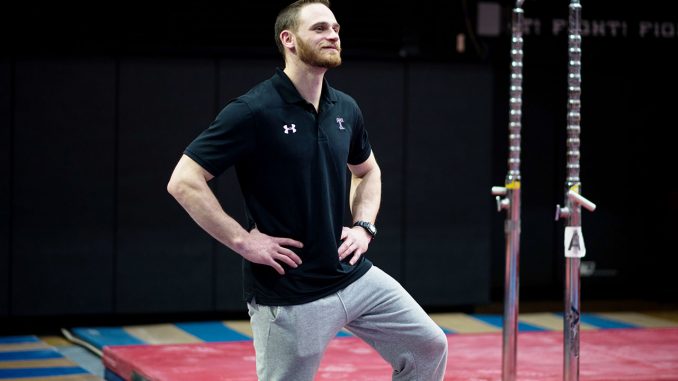
Jesse Kitzen-Abelson was living just outside Durban, South Africa, when Temple announced its plans to cut the varsity gymnastics program in December 2013.
Kitzen-Abelson, who competed for Temple from 2007-11, was in his second year working as a coach at the Pinetown Gymnastics Club — a job he found through the connections of his former Temple coach, Fred Turoff.
“When I first heard about it, it didn’t seem real,” Kitzen-Abelson said.
Temple’s decision to cut the program motivated him to return to the United States and coach the club men’s gymnastics team.
This is Kitzen-Abelson’s first full season coaching the team. He is responsible for taking over for Turoff, who coached the varsity program from 1976-2014 and coached the club team until deciding to step down in Fall 2017.
Turoff is still involved with the club, helping Kitzen-Abelson create a direction for its future. Kitzen-Abelson is now tasked with creating a program that is sustainable for the long term.
“I came in last year and went, ‘OK, what’s the plan?’” he said. “‘How are we going to reformat it? Teams have done it before, why can’t we do it? There’s a gym right here, I want to help with it and there’s a little bit of money in the budget. So let’s see what we can do.’”
Few college-level teams have gone from varsity to club status. So Kitzen-Abelson started by contacting coaches at the few schools that have had this experience.
He reached out to coaches like Jim Holt at the University of Washington, who led the team as a club after the varsity program was cut in 1980, and Scott Barclay, who headed Arizona State University’s program when it became a club in 1993.
“I talk to them all the time,” Kitzen-Abelson said. “I call them up and say, ‘Hey, this is what’s happening, how do I handle this?’ It’s a very complicated process. The possibilities are endless for sure, but I’ve got to figure out how can we survive this year and how I can bring more guys in.”
To assist with recruiting, Turoff said he gave Kitzen-Abelson all of his recruiting materials and his lists of gymnasts to watch, but he has remained mostly hands-off. Kitzen-Abelson said he also uses information from databases given to coaches at the Junior Olympic National Championships to contact coaches and tell them that his program can take high school gymnasts.
While Kitzen-Abelson said recruiting without scholarships is difficult, sophomore gymnast Evan Salters said Temple is a good choice for gymnasts in a landscape with shrinking opportunities to compete in college.
“There’s not much point in going back to varsity,” Salters said. “There are only 16 programs left at the varsity level. At this point, most guys are lucky enough to get on a good club program like Temple, [Arizona State] or Washington.”
But to sustain Temple’s club team, fundraising is key. The majority of the team’s revenue comes from alumni donors and the rest comes from fundraising events, Turoff said.
“We don’t have enough money to bring it up to the varsity level that we had before,” Turoff added. “I’m always looking for donors, from $5 to $500,000.”
Turoff also assists with everyday tasks, like setting up mats before meets and lending supplies from his own gymnastics club in Germantown.
Turoff, who competed for Temple from 1966-69, amassed more than 400 coaching victories and was inducted into the Temple Hall of Fame in 1984. He said the transitional period was a perfect time for him to step down and hand the reins to Kitzen-Abelson.
“You go anywhere around the world, people know Fred Turoff,” Kitzen-Abelson said. “Filling in those shoes, there’s not much bigger than that. It’s really crucial that Fred stuck around to help with the transition of this team.”
And Turoff said he plans to help for however long he is needed.
“Certainly, it’s a big change,” Turoff said. “It’s very difficult because we have to raise a lot of money, and the club is student-driven not coach-driven, so we can’t tell them what to do. I just have to offer my services. It’s quite a challenge, and it’s such a different time.”



Be the first to comment